Sustainability Series – Part 01: A Changing Landscape
Sustainability is (literally) a hot topic these days, with social demands and strikes on the rise – businesses and governments are desperately seeking solutions.
We, here at Locus, have been active in this space for a long time, but with the landscape moving so fast and urgency at hand we thought it was fitting to assess the current status.
Knowing that there are many contributing factors and moving parts we decided to tackle the beast in a 3 part Sustainability Series.
Part 01: A Changing Landscape will take a look at social pressures, global initiatives, and the environmental status of NZ.
In Part 02: Regulations and Reality, we will try and make sense of the current NZ regulations in place and their practical outcomes.
And finally, we will look at the business implications in Part 03: Taking action – where we will also discuss case studies and tools to get you excited about positive change – that doesn’t cost you your business.
PART 01: A Changing Landscape
The Un Climate Change Summit has just been, and Extinction Rebellion groups are taking to the streets and to parliaments to highlight one of if not the most urgent crises of our lifetime. It is hardly imaginable you have missed any of the above.
You may not agree with the methods of the rebellion or with the (in)actions of governments worldwide – one thing is for sure we are facing a crisis. We can not ignore the situation and carry on with Business As Usual, because THIS IS NOT BUSINESS AS USUAL
The pressure is on and debating the time we have is pretty futile, it is running out. The bright side is that we have a window to act and act fast.
People are waking up, and small wins are here. These little shifts, like the ban of single-use plastic bags, contribute to a better all-round awareness, but unfortunately do not always add to the most significant wins overall. We should certainly continue to take small steps, but the big impact changes will have to come from bigger shifts.
To test your own knowledge on this front, we highly recommend you take this easy quiz – the results might amaze you.
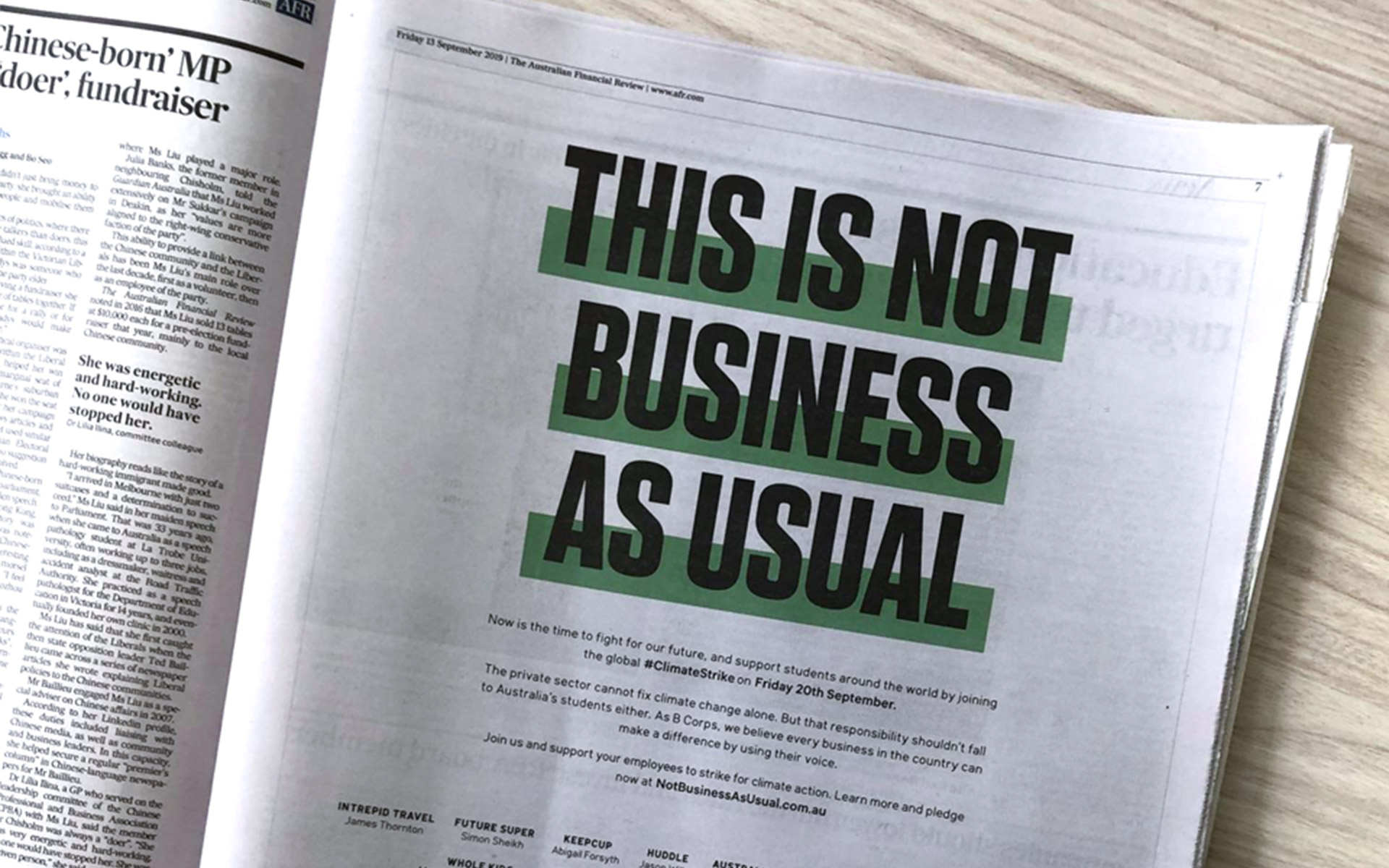
Global Changes
Worldwide initiatives are popping up to help individuals, as well as companies, make better choices. More and more people are changing their (consumer) behaviours.
Being (part-time) vegetarian or vegan is mainstream, and prominent companies like Beyond Meat and Impossible Foods are solidifying this notion. Not only that, we see a turning away from fast fashion and the waste and pollution it represents, and an overall growth in the minimalist approach.
We are also more keen to make our products last, see websites like ifixit, or even make our own over buying ready-made products. Going zero waste is a challenge that is more attractive than ever – one might even call it fashionable (let’s hope it lasts).
All of the above does not mean people are giving up on “luxury” or the occasional indulgence. They are resetting their values and reevaluating what brings joy and fulfilment.
Looking for Guidance
The green wave has clearly not gone unnoticed for companies around the world. Environmental (and social) considerations are either an intrinsic part of their DNA (Think Patagonia or locally Ecostore) or being incorporated in mission and company updates – with a risk of greenwashing. Rather than making minor changes with little impact, leading companies are looking for more holistic approaches.
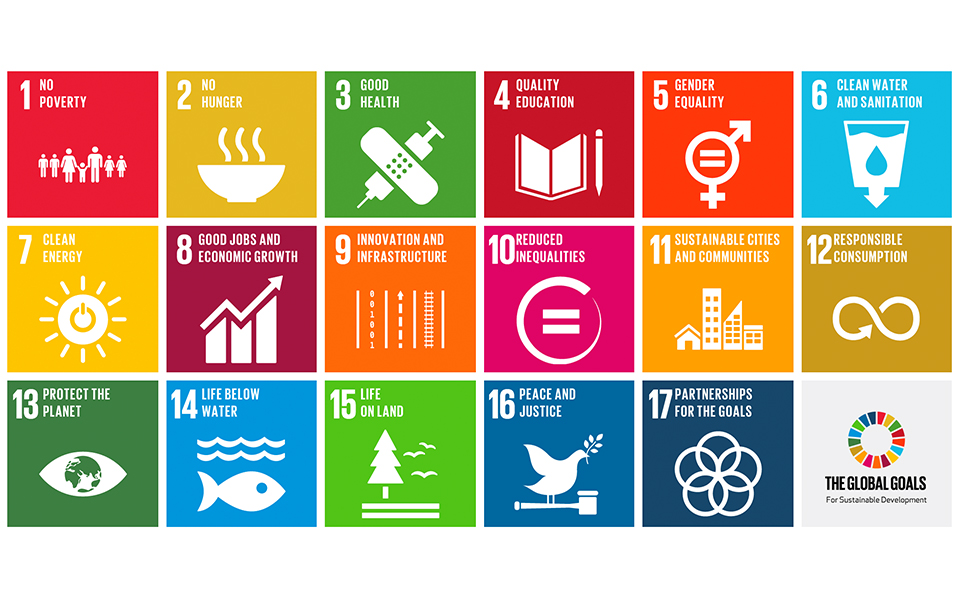
UN: 17 Sustainable Development Goals
The United Nations provides a good starting point with its 17 Sustainable Development Goals. The goals were adopted by all United Nations Member States in 2015 – and 1000’s of partners have joined to make it a reality. The Goals provide a blueprint for peace and prosperity for people and the planet, now and into the future. And this blueprint can easily be adopted in a business sense – guiding you to make better environmental and social choices.
B Corp Certification
Another great example is the B corporation certification which has been gaining a lot of traction. It envisions a global economy that uses business as a force for good. Companies that sign up are legally required to consider the impact of their decisions on their workers, customers, suppliers, community, and the environment. Want to know what your current impact is like? Go to the B Impact Assessment site and find out.
Ellen MacArthur Foundation
You probably have heard us mention the Ellen Macarthur foundation before. They are leading the way in guiding and supporting corporations and governments around the world in their bids to become more circular. The foundation provides excellent resources and is rightfully seen as one of the most influential organisations in this space.
The Role of Government
Besides independent organisations showing the way, the government clearly has a role to play when it comes to leadership.
We will look into this more in Part 02, but for now, a global change worth mentioning is the “Rights to Repair Act” for electronic goods. Recently the European Union has ratified its “right to repair” regulations and will be forcing manufacturers of electronic items like televisions, lighting, fridges, washing machines and dishwashers to make their products longer lasting with the supply of spare parts for up to 10 years. A step in the right direction, however, at this point it does not include essential equipment like mobile phones and laptops.
Twenty states across America have introduced Right to Repair laws in 2019, but none have passed yet. And closer to home, Australia is working on their own version, and this will likely influence our local approach as well.
Putting more responsibility on Manufacturers and their environmental impact is also reflected in the new proposed product stewardship program (link to news item)
Current Environmental Performance in NZ
So what is happening here in New Zealand? According to the 2018 Environmental Performance Index (EPI)* we rank 17th globally. This comprehensive index ranks 180 countries on 24 performance indicators across ten issue categories covering environmental health and ecosystem vitality. It provides a gauge at a national scale of how close countries are to established environmental policy goals.
* The EPI is produced jointly by Yale University and Columbia University in collaboration with the World Economic Forum. The 2018 EPI was created with generous support from the McCall MacBain Foundation and Mark T. DeAngelis.
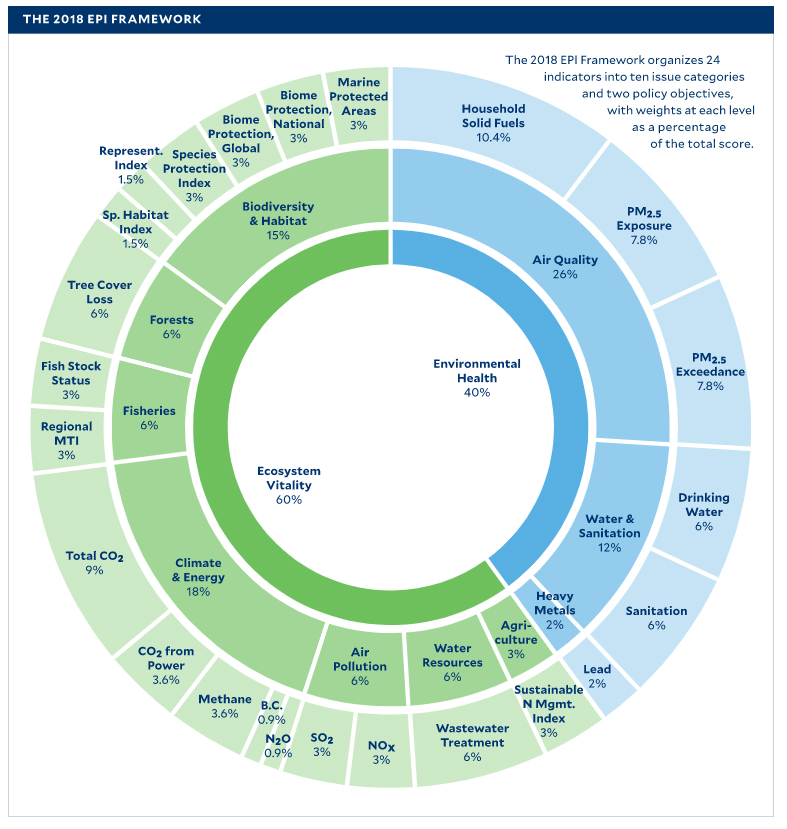
We might be a bit chuffed being among the top performers, the reality is that this competition reflects a rather stark end-goal and doing well is simply not good enough. And when looking at the breakdown of the EPI report, we start seeing the issues known well here. With a clear example of our methane output ranking being 120th out of 140!
Earlier this year the Ministry of environment and Stats NZ brought out the Environment Aotearoa 2019 report. This body of work looks at our status at a more local and granular level – and highlighted similar findings.
The backbone of the report are 60 indicators analysed and researched by stats NZ. They helped identify nine priority issues:
- Our native plants, animals and ecosystems are under threat.
- Changes to the vegetation on our land are degrading the soil and water.
- Urban growth is reducing versatile land and native biodiversity.
- Our waterways are polluted in farming areas.
- Our environment is polluted in urban areas.
- Taking water changes flows, which affects our freshwater ecosystems.
- The way we fish is affecting the health of our ocean environment.
- New Zealand has high greenhouse gas emissions per person.
- Climate change is already affecting Aotearoa New Zealand.
The indicators and the report show a shocking state of affairs – and hopefully will leave us with no other option than to act.
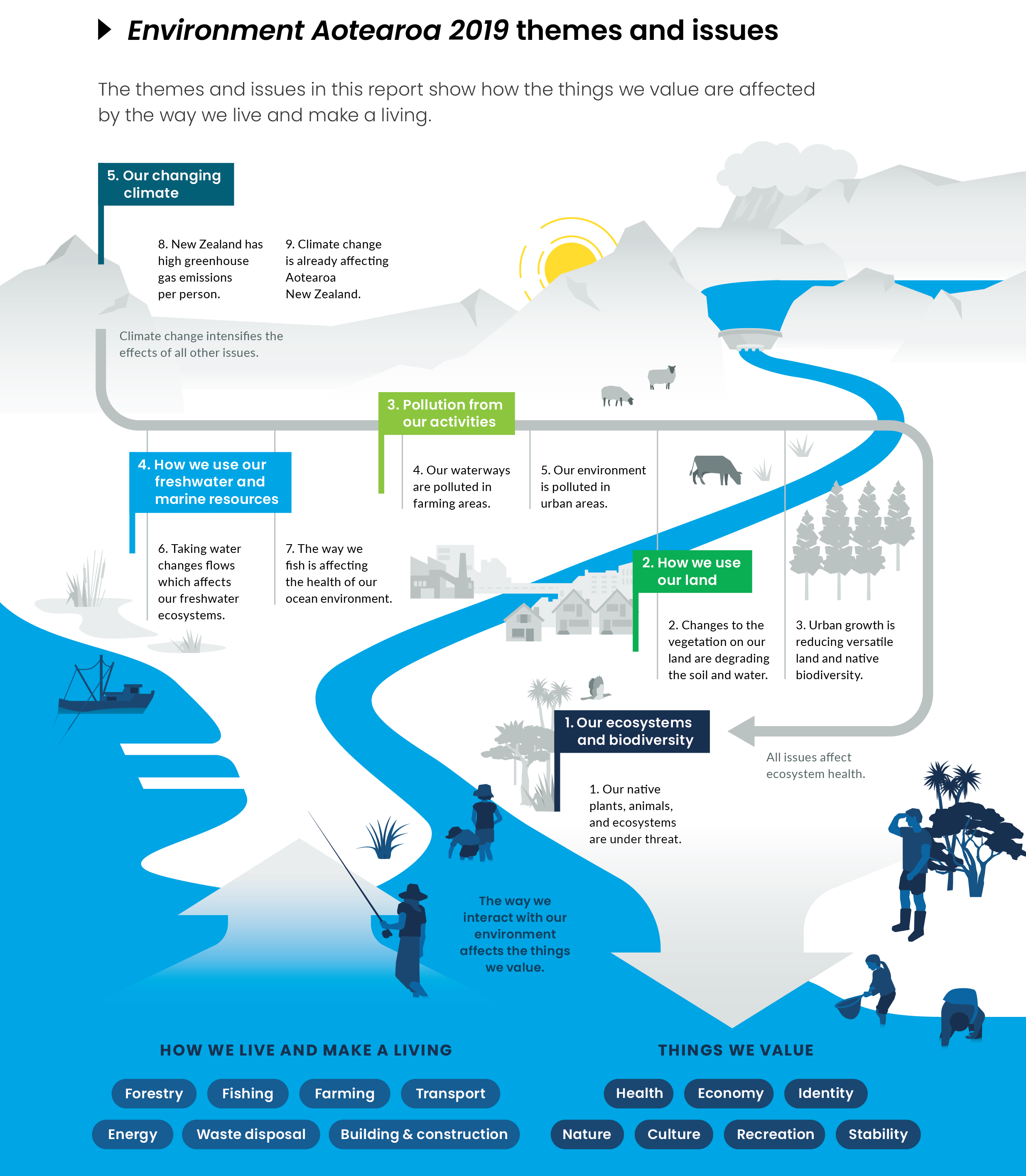
The question now is what are we going to do about it?
The government has set emission goals for 2020, 2030, and 2050. Unfortunately, these goals are not likely to be met. And seeing government struggle with some of their own ambitions, like their EV program, sure doesn’t help. It seems that their promises and the attached realities weren’t balanced out correctly, which ultimately can lead to mistrust and overall ambivalence.
As the government is initiating new programs, one can wonder if they will come to life in time. Taking the initiative ourselves will be a positive reaction and can simply be a good business decision – but more on that in Part 03: Taking Action.
In the meantime, feel free to come and have a chat with us on how we can help you and your company make inroads with Life Cycle Thinking.
Want to read more on creativity, design, product development and innovation? Go to our Six Lenses Blog.
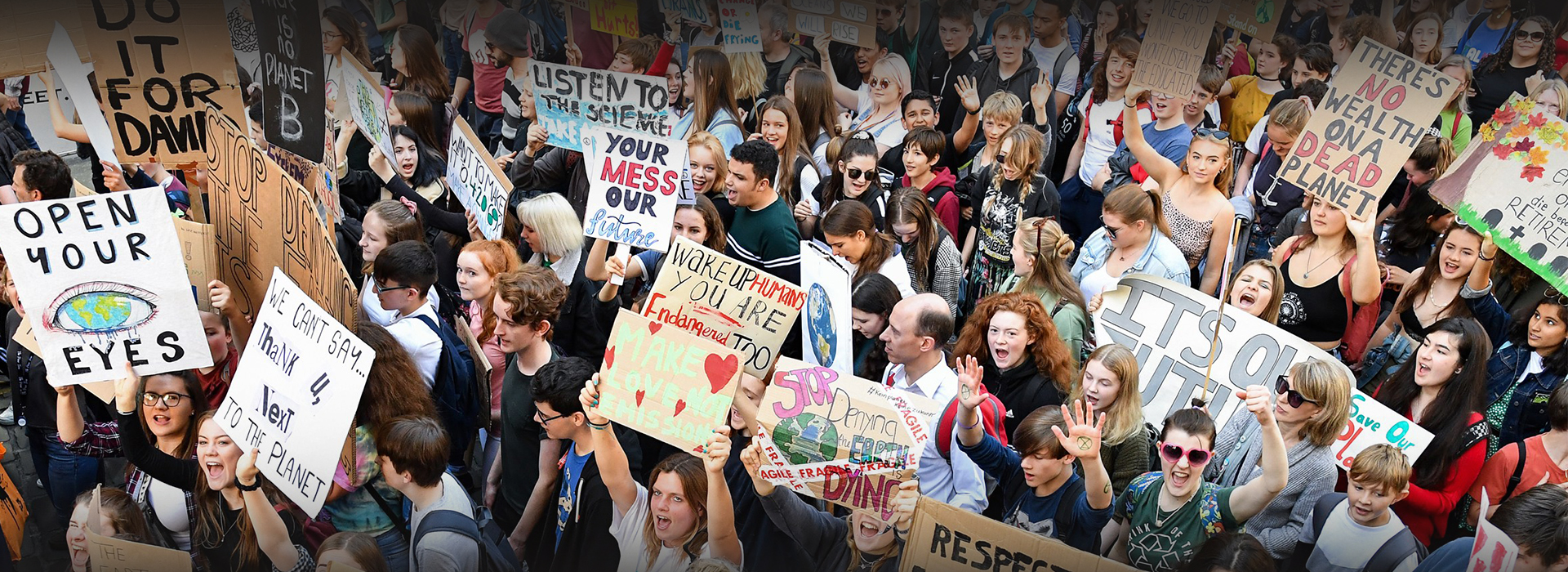

Comments